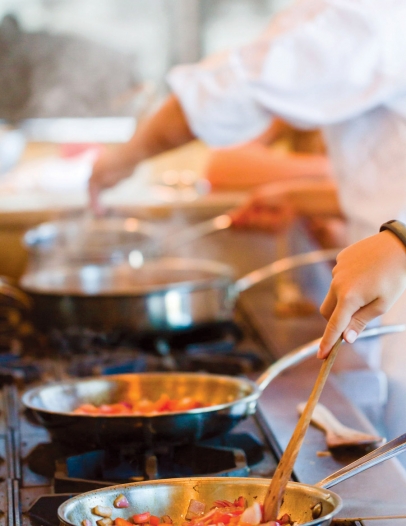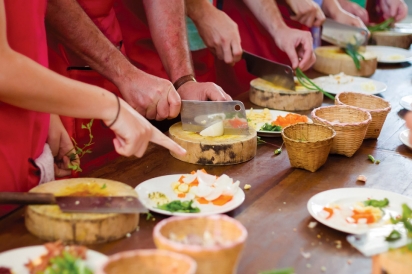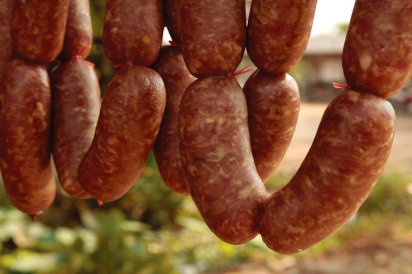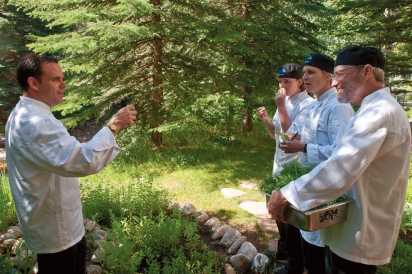Culinary Education
Your guide to cooking, baking, butchery and more
Editor’s note: Following is a diverse selection curated by our writer and staff, designed to inspire you to get cooking, but by no means a comprehensive listing of educational programs.
AS COLORADO’S REPUTATION for culinary excellence and agricultural innovation flourishes, a relationship between industry experts—bakers, butchers, farmers, ranchers, chefs—and the communities they serve grows stronger. No surprise, then, that consumers want to know these experts and learn from them. Here are some of our favorite programs in which to gain new culinary skills and confidence, in many cases directly from the people who grow and raise our food.
Recreational Cooking Classes
Cooking School of Aspen: Rob Ittner, owner of Rustique Bistro, opened the school in March 2016, creating a 120-seat educational facility and event space designed for demonstration and hands-on classes taught by Aspen-based instructors like Jimmy Nadell and Susie Jimenez and visiting guest chefs from all over the world. Experiential courses range from pasta making, baking at altitude, ethnic cuisine and knife skills to stocks and sauces and cooking with grains. Kids’ classes and camps are also available (970.920.2002, CookingSchoolOfAspen.com).
In Denver’s LoDo neighborhood Cook Street School of Culinary Arts offers an accelerated professional culinary-arts program emphasizing core fundamentals of cooking, pastry and wine, in addition to offering recreational cooking classes. Recreational classes, like Butchery for Cooks and Classic Techniques: Artisan Bread, are designed for beginner and more advanced home cooks (303.308.9300, CookStreet.com). Also in Denver Stir Cooking School offers novice and professional cooking classes in the trendy Highlands neighborhood. Enjoy a cocktail before or after class at the Stir bar (720.287.4823, StirToLearn.com). Boulder-based Food Lab offers a variety of hands-on classes with an emphasis on global themes, like Flavors of Thailand and Barcelona Nights. Most of the three-hour classes include a sit-down meal; kids’ classes are also available (303.953.8364, FoodLabBoulder.com). In Aspen, caterer/restaurateur/ chef Mawa McQueen offers private adult and kids’ cooking classes year-round through Mawa’s Kitchen (970.544.4862, MawasKitchen.com). At Tourné Cooking School in Grand Junction, one-on-one private and hands-on small-group classes are offered out of owner Suzanne Hanzl’s home, or she’ll come to your abode. Expect an emphasis on clean eating, time management, organization, working with budget, knife skills and other techniques. Et voila! (TourneCooking.com).
Butchery
This centuries-old craft has never been more in vogue. Thanks to the popularity of nose-to-tail cookery and specialty butcher shops committed to sustainable livestock production, consumers are eager to learn about lesser-known cuts of meat and how to break down whole animals. For an immersive experience like the latter, there’s the Boulder Butchery Guild where founders Alberto Sabbadini and Veronica Volny teach students how to break down whole animals into cookable cuts, as well as learn how to build relationships with local ranchers committed to sustainable land management and husbandry practices. You’ll come away from their intensive workshops with impressive knife skills and an understanding about how to use all parts of a pig or lamb. Bonus: Some classes send participants home with meat. There are also workshops on whole-chicken butchery and sausage crafting (BoulderButcheryGuild.com).
Baking & Pastry
Some of Colorado’s best artisan bread producers focus on traditional approaches like on-site flour milling and local ingredient sourcing and are committed to reviving the historical concept that bakeries are fundamental to tight-knit communities. You can make and break bread with the folks at Carbondale Community Oven (970.963.9371, CarbondaleCommunityOven.weebly.com), where you’ll learn how to bake at altitude and walk away with warm loaves of whole-grain and sourdough bread straight from the outdoor, wood-burning oven. On the Front Range, call for information about upcoming classes at Grateful Bread Company (303.681.5406, GratefulBread.com), a bakery that’s been making handcrafted loaves since 2006. Owners Jeff Cleary and Kathy Mullen are dedicated to advancing Old World techniques in bread and pastry baking, like using a custom stone flour mill, to further their devotion to on-site milling and local sourcing. To continue to expand its local sourcing program, Grateful Bread has partnered with Fort Collins’ Motherlove Organic Farm to source organic rye and yellow corn grits.
Vocational Classes
Colorado’s culinary programs are preparing students for a broad range of food-related careers and focusing on changes and trends within our food system. At the Denver campus of Johnson & Wales University (877.598.3368, JWU.edu/Denver), one of the nation’s leading culinary schools, students can major in baking and pastry arts; beverage industry operations and retail management; or culinary arts, and have the option to earn bachelor’s degrees in culinary nutrition and business studies. Some JWU alums land in the kitchens of top restaurants; many others secure corporate positions in research and development or even cooking for professional sports teams. Students learn that sustainable practices are financially viable, and core to running a sustainable operation is using ingredients fully (like making pesto from carrot tops). Those with culinary career dreams rooted in sustainability can attend Colorado Mountain College’s (CMC) Culinary Institute (970.569.2920, ColoradoMtn.edu). The CMC Edwards campus offers a degree in culinary arts, which includes two courses in sustainable cuisine, including an introduction to the complexities of creating a more sustainable food system, and a class designed to help food service professionals make pragmatic decisions that enhance the sustainability of their operations. At Boulder’s Auguste Escoffier School of Culinary Arts (855.983.5997, Escoffier.edu), which offers a curriculum influenced by the teachings of famed French chef Auguste Escoffier, students immerse themselves in a Farm to Table Experience program where they’re exposed to sustainable agriculture, local ingredient sourcing and innovative animal husbandry practices. Grand Junction–based Western Colorado Community College (970.255.2600, ColoradoMesa.edu) offers Associate of Applied Science degrees in baking and pastry and culinary arts. Comal (Comal@focuspoints.org, Facebook.com/ComalKitchen) is a Denver-based food incubator, restaurant and women-only culinary training program. Comal offers recreational classes to the public taught by Mexican and Syrian immigrant women, although its primary purpose is to help home cooks, including recent refugees and immigrants, with entrepreneurial goals to break into the food service industry. Students learn the skills necessary to transition from talented home cook to professional food business owner. The eight-month paid training program, where 60 percent of all onsite restaurant proceeds go to the students, focuses on technique, food service standards and sanitation, financial management and sustainable practices.







